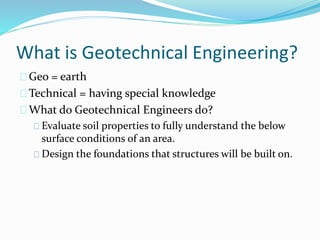Geotheta Things To Know Before You Buy
Geotheta Things To Know Before You Buy
Blog Article
Some Known Details About Geotheta
Table of ContentsEverything about GeothetaThe Ultimate Guide To GeothetaSome Known Incorrect Statements About Geotheta What Does Geotheta Do?The Main Principles Of Geotheta

They perform site investigations, gather examples, carry out research laboratory tests, and evaluate information to review the viability of the ground for building and construction projects - Geo Tech Engineer. Based upon their findings, geotechnical engineers give recommendations for foundation style, incline security, maintaining frameworks, and mitigation of geotechnical risks. They team up with various other professionals, such as architects, structural engineers, and building groups, to make certain that geotechnical considerations are integrated into the overall project style and application
By analyzing the behavior and buildings of dirt and rock, they can recognize possible geotechnical threats such as landslides, dirt negotiation, or incline instability. Their expertise helps avoid failings or crashes that might threaten lives and property. Below are some thorough duties and responsibilities of a geotechnical engineer: Website Examination: Geotechnical engineers conduct site investigations to collect information on subsurface conditions.
They analyze the information to recognize the residential properties and actions of the dirt and rock, including their toughness, permeability, compaction characteristics, and groundwater conditions. Geotechnical Analysis and Style: Geotechnical engineers examine the data gathered during website examinations to analyze the stability and suitability of the website for building jobs. They carry out geotechnical computations and modeling to examine aspects such as birthing capability, settlement, slope security, side earth pressures, and groundwater circulation.
An Unbiased View of Geotheta
Structure Style: Geotechnical engineers play an important role in developing structures that can safely support the desired structure. They evaluate the soil conditions and load needs to figure out the suitable foundation kind, such as shallow structures (e.g., footings), deep structures (e.g (https://profile.hatena.ne.jp/geotheta/)., stacks), or specialized methods like soil renovation. They think about variables such as settlement restrictions, birthing capability, and soil-structure communication to establish ideal foundation designs
They assess construction strategies, screen site activities, and perform area assessments to verify that the layout referrals are complied with. If unexpected geotechnical issues develop, they evaluate the circumstance and supply referrals for removal or modifications to the layout. Threat Assessment and Mitigation: Geotechnical designers evaluate geotechnical dangers and dangers connected with the task website, such as landslides, liquefaction, or soil erosion.

Partnership and Communication: Geotechnical designers function closely with various other experts included in a task, such as designers, structural designers, and building teams. Reliable communication and cooperation are important to incorporate geotechnical considerations into the total job design and construction procedure. Geotechnical engineers give technical know-how, answer inquiries, and make sure that geotechnical requirements are fulfilled.
9 Easy Facts About Geotheta Explained
Right here are some kinds of geotechnical engineers: Structure Engineer: Foundation engineers specialize in making and examining structures for structures. They evaluate the dirt problems, load demands, and website features to identify the most proper foundation kind and design, such as shallow structures, deep structures, or specialized strategies like pile foundations.
They examine the factors influencing slope stability, such as soil properties, groundwater conditions, and slope geometry, and establish strategies to stop slope failures and alleviate dangers. Quake Designer: Quake designers concentrate on analyzing and designing structures to withstand seismic forces. They assess the seismic risk of a site, assess soil liquefaction potential, and develop seismic style standards to make certain the security and durability of frameworks throughout quakes.
They perform field screening, accumulate examples, and analyze the accumulated data to identify the soil properties, geologic developments, and groundwater problems at a site. Geotechnical Instrumentation Engineer: Geotechnical instrumentation designers concentrate on tracking and measuring the habits of soil, rock, and frameworks. They set up and preserve instrumentation systems that monitor factors such as dirt negotiation, groundwater levels, incline movements, and architectural variations to evaluate performance and give very early warnings of potential problems.
About Geotheta
They perform tests such as triaxial examinations, debt consolidation tests, direct shear tests, and leaks in the structure tests to collect data for geotechnical analysis and design. Geosynthetics Engineer: Geosynthetics engineers concentrate on the design and application of geosynthetic products, such as geotextiles, geogrids, and geomembranes. They utilize these materials to enhance soil stability, strengthen slopes, give drainage services, and control disintegration.
They tend to be investigative people, which suggests they're intellectual, reflective, and curious. They are interested, systematic, reasonable, analytical, and rational. Several of them are additionally social, suggesting they're kind, generous, cooperative, individual, caring, useful, understanding, skillful, and pleasant. Does this audio like you? Take our totally free occupation test to learn if geotechnical engineer is just one of your top job matches.
In the office atmosphere, geotechnical engineers utilize specialized software devices to execute estimations, produce designs, and examine data. They prepare reports, testimonial task specs, interact with clients and team participants, and coordinate task activities. The office setup supplies a helpful environment for study, evaluation, and partnership with various other professionals involved in the task.
Geotheta Fundamentals Explained
They frequently visit task websites to conduct website examinations, examine geotechnical problems, and gather information for analysis. These visits entail taking a trip to different areas, in some cases in remote or tough terrains. Geotechnical engineers may do soil tasting, conduct examinations, and screen construction activities to ensure that the geotechnical elements of the task are being executed appropriately.
Geotechnical designers additionally function in specialized geotechnical websites research laboratories. Geotechnical research laboratory designers work extensively in these environments, dealing with testing devices, operating instruments, and tape-recording information.
Report this page